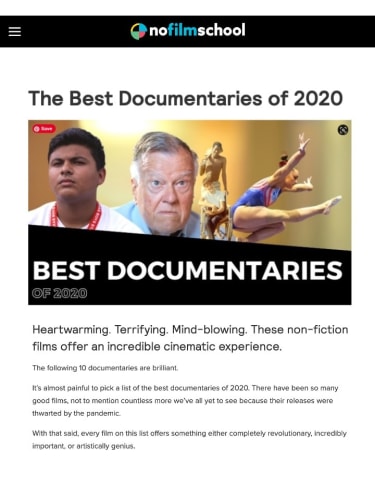The Best Documentaries of 2020
No Film School
12/28/2020
Back
By Oakley Anderson-Moore
Heartwarming. Terrifying. Mind-blowing. These non-fiction films offer an incredible cinematic experience.
The following 10 documentaries are brilliant.
It’s almost painful to pick a list of the best documentaries of 2020. There have been so many good films, not to mention countless more we’ve all yet to see because their releases were thwarted by the pandemic.
With that said, every film on this list offers something either completely revolutionary, incredibly important, or artistically genius.
Most Heartwarming: Crip Camp
If you’ve got a chunk of ice lodged in your solar plexus region where your humanity once was, this film will melt it. And it will probably completely shift your perspective on people who are disabled.
This film has an amazing story: one of the directors, a doc sound mixer and disabled superhero Jim LeBrecht, thought he might be able to find some old black-and-white footage from a place called Camp Jened. The result was revolutionary! Teaming up with accomplished filmmaker Nicole Newnham, this film went on to become the first one ever produced by the Obamas.
The film is a must-see, and read a brilliant interview with the filmmakers here.
Best Fly-on-the-Wall: Higher Love
The first thing you should know: filmmaker Hasan Oswald sold his blood plasma to make this film. Are you that dedicated? His singular vision for the film is visible every minute on screen—following his subjects through harrowing drug abuse, searching the streets for loved ones, and raising young children. Throughout, the film combines vérité style with unconventional montages and ethereal drone footage, leaving viewers with a gut-wrenching feeling about the people living inside the walls of the imploding post-industrial American city.
Most Jaw-Dropping: Welcome to Chechnya
Jaw-dropping for two reasons: how the film is made, and the story itself. Welcome to Chechnya follows anti-gay and lesbian purges in Chechnya. The story is shocking.
And also, it is dropping jaws because of the highly precarious safety of the people in the film. The documentary employed Deepfake technology to protect their identities at all costs. Listen to editors Tyler H. Walk and Maxwell Anderson in the No Film School Editors' Roundtable to hear some of the incredible details of this film.
Best Coming-of-Age: Us Kids
Following the mass-shooting-survivors-turned-activists of Marjory Stoneman Douglas High School, Us Kids documents a group of teenagers growing up. They oscillate between larger-than-life figures, dealing with PTSD and trauma of lost classmates while leading the March for Our Lives, and being regular teenagers who graduate high school and start on the path of the rest of their lives. It’s as compelling a portrait of gun violence as it is about this generation.
Most Cinematic: The Truffle Hunters
Michael Dweck first entered documentary filmmaking with his unusual film The Last Race, which was an existential high-art look at a closing racetrack. Now teaming up with co-director Gregory Kershaw, this signature style goes further in this new doc about exquisite Italian cacciatori di tartufi. The film is so visually stunning, Sony Pictures Classics picked it up.
Best Political Thriller: A Thousand Cuts
This is some kind of taught crime drama, perhaps where the crime is free press and the victim is Filipino president-cum-dictator Rodrigo Duterte. The heroine? Independent female journalist. The film artfully constructs the feeling of being a country under a wave of democracy-eroding, murder-sanctioning governmental oversight—from the perspective of a group of women journalists working tirelessly to tell that story. Even if it means being arrested for doing so.
Most Controversial: Bloody Nose, Empty Pockets
At its premiere at the 2020 Sundance Film Festival, people walked out of the theater and asked for their money back. Why? They were shocked to hear how the film was made and thought it was pushing the envelope too far. It broke the rules!
That’s why it’s interesting. Read our interview here with the clever filmmaking brothers and learn why the film is so controversial.
Best Experimental: maɬni – towards the ocean, towards the shore
In his first feature after compiling a canon of experimental short films, Sky Hopinka uses the circle of the Chinookan origin of death myth to re-imagine the linear storytelling conventions. The result is an evocative experimental documentary, which is as grounded in cinematic realism as it is lofty and unconventional.
Most Relevant to the American Zeitgeist: Time
In a year with the streets overflowing with protests about police brutality and a growing awareness of an unfair prison-industrial-complex, a film like Time is achingly important. The film follows Sibil Fox Richardson and over 100 hours of diaries she recorded fighting to get her husband back after a 60-year prison sentence.
Best Human Portrait: We Are As Gods
Jason Sussberg and David Alvarado have made a career profiling eccentric geniuses, from Bill Nye: Science Guy to nearly-mad scientists of The Immortalists who are racing to find the cure for death. This time, the filmmakers return to collaborate on a film following who some people call “the DaVinci of Cyber Culture” Stewart Brand. Pairing their signature visual style with archives and always cutting edge sound design, the documentary brings Brand to life. And the cherry on top is that the film has an original score from Brian Eno!